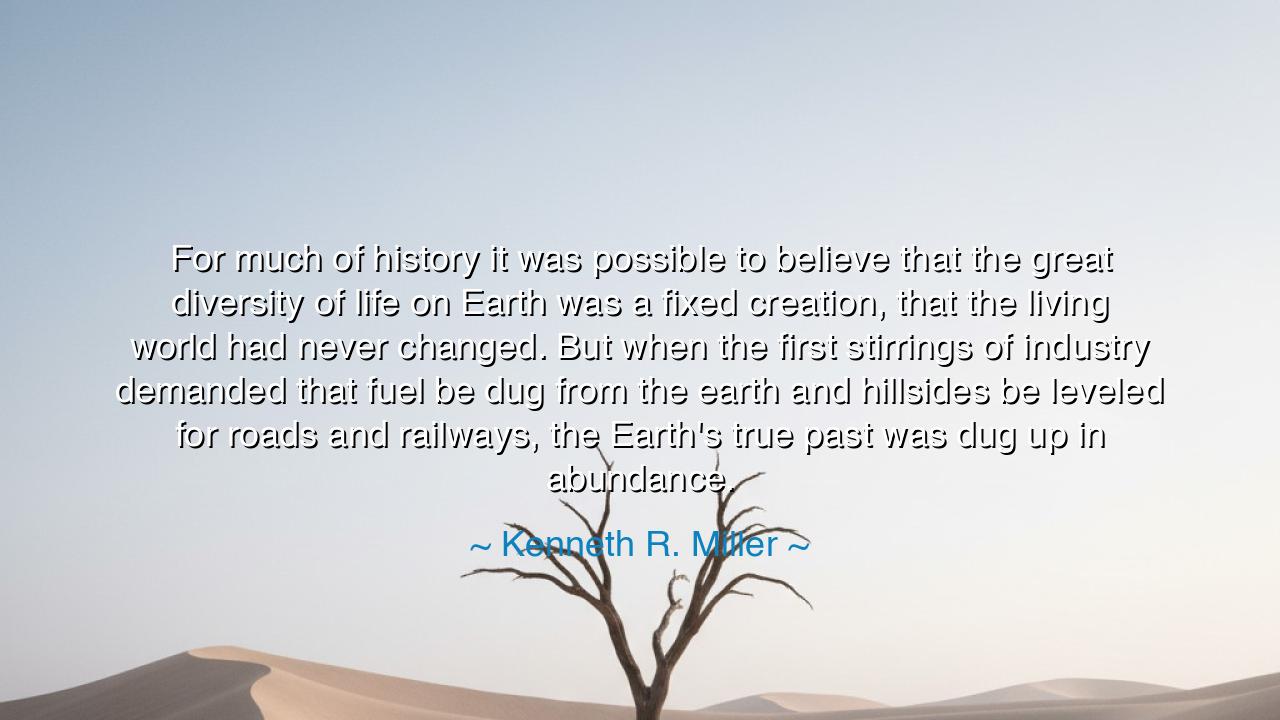
For much of history it was possible to believe that the great
For much of history it was possible to believe that the great diversity of life on Earth was a fixed creation, that the living world had never changed. But when the first stirrings of industry demanded that fuel be dug from the earth and hillsides be leveled for roads and railways, the Earth's true past was dug up in abundance.






The biologist and thinker Kenneth R. Miller once wrote: “For much of history it was possible to believe that the great diversity of life on Earth was a fixed creation, that the living world had never changed. But when the first stirrings of industry demanded that fuel be dug from the earth and hillsides be leveled for roads and railways, the Earth's true past was dug up in abundance.” These words are not simply about science; they are about awakening—the moment when humankind, in its hunger for progress, accidentally unearthed the profound truth of its own impermanence. In this sentence, Miller weaves a story of both irony and revelation: that the engines of industry, which often scarred the Earth, also opened humanity’s eyes to its ancient story buried beneath the soil.
For centuries, the human spirit was content to see the natural world as unchanging, fixed in divine perfection. The mountains stood eternal, the species immutable, the world young and orderly. But when man’s ambition turned downward—when his hands reached into the stone and coal of the Earth—the illusion shattered. The fossils, the strata, the ancient bones of forgotten creatures told another story: that the Earth was far older, more turbulent, and more creative than anyone had imagined. From the black lungs of coal mines and the dust of quarries, the truth of evolution rose—life was not a single act of creation, but a long, unfolding symphony of change.
This revelation was born of irony. Humanity’s industrial revolution, which sought only fuel and fortune, inadvertently revealed the deeper architecture of life. The machines that darkened the skies with smoke also illuminated the mind with understanding. In seeking to master the Earth, humans discovered how deeply they were woven into its history. The discovery of fossils—beasts with no living counterparts, shells embedded in mountains, giant bones unearthed in England and America—challenged the ancient belief that creation was static. Each fragment of stone whispered that time itself was an artist, carving, erasing, and creating anew.
Such transformations of understanding are not unique to science—they are the rhythm of history itself. When Copernicus looked to the heavens and found that Earth was not the center of the cosmos, mankind was humbled. When Darwin, centuries later, gazed at the same world and saw not fixity but flux, humanity was humbled again. Each revelation peeled away another layer of pride, revealing a truth both beautiful and unsettling: that the universe does not revolve around us, but we are participants in its vast unfolding. Miller’s quote captures this humility—the realization that our most confident certainties can crumble beneath the weight of evidence, and that truth often lies hidden where we least expect it.
And yet, Miller’s reflection carries more than history; it carries warning. The same industrial hands that uncovered the Earth’s past now threaten its future. The fuel we tore from the ground not only revealed our origins but now imperils our destiny. The ancient carbon that once formed the world’s forests, now burned in our furnaces, reshapes the planet’s climate. Thus, the lesson of the Earth’s deep past should not end with wonder—it must awaken responsibility. We are not separate from the natural order we discovered; we are part of it, bound by its laws and subject to its consequences.
The story of discovery, then, is also a story of humility. The Earth has outlived empires, languages, and myths, and it will outlive us if we do not learn from what it has already told us. The fossils we find are not merely relics—they are warnings written in stone, reminders of species that thrived and vanished. In unearthing them, we glimpse both our origin and our fate. The irony that Miller speaks of—that human greed led to human enlightenment—must inspire us to seek knowledge not through exploitation, but through reverence.
So let this be the teaching: progress without wisdom is blindness, and curiosity without humility is arrogance. The Earth does not yield its secrets lightly, but when it does, we must listen. Learn from the soil, the bones, the rivers, and the stones, for they are the oldest teachers of all. As Kenneth R. Miller reminds us, even in our quest for power, truth may rise from the depths we disturb. And when it does, may we have the courage to heed its voice—not as conquerors of the Earth, but as its awakened children.






AAdministratorAdministrator
Welcome, honored guests. Please leave a comment, we will respond soon